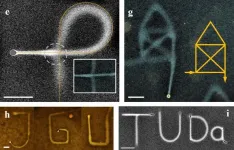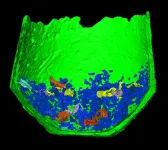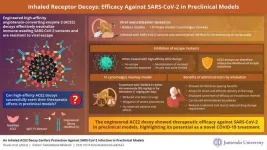(Press-News.org) A new study by researchers from Mass General Brigham further illustrates that when it comes to risk of Alzheimer’s disease, even genetically determined forms of the disease, genetics is only one piece of the puzzle. Researchers investigated the influence of genetics and educational attainment on cognitive decline by studying data from 675 people who carry a mutation that predisposes them to early onset Alzheimer’s disease. Carriers of this mutation—known as PSEN1 E280A—have a median age of 49 for onset of dementia. The team found that among carriers who also carried a second mutation that puts them at heightened risk—APOE e4—had an accelerated age of onset of cognitive decline. Among carriers who had an APOE e2 mutation—known to be protective—age of onset was delayed. The team also assessed the effect of educational attainment on cognitive function among PSEN1 E280A mutation carriers, including those who carried different APOE genotypes. They found that higher educational attainment—that is, more years of education—was associated with preserved cognitive ability particularly for those at highest genetic risk.
“Higher educational attainment may have a protective effect against cognitive impairment, even in the presence of strong genetic risk factors,” said corresponding author Yakeel Quiroz PhD, a clinical neuropsychologist and neuroimaging researcher, director of the Familial Dementia Neuroimaging Lab in the Departments of Psychiatry and Neurology at Massachusetts General Hospital. “Despite the additional risk conferred by APOEe4, the strongest genetic risk factor for sporadic Alzheimer's disease, our results suggest that educational attainment may be a critical mechanism of cognitive reserve in familial Alzheimer’s disease.”
The research team included investigators from Massachusetts General Hospital, Brigham and Women’s Hospital, Mass Eye and Ear, and national and international collaborators.
about the study’s findings in Nature Communications.
END
Educational attainment protects against a genetic risk factor for Alzheimer’s disease
2023-08-30
ELSE PRESS RELEASES FROM THIS DATE:
Virtual institute at the University of Kansas to combat cyber threats
2023-08-30
LAWRENCE, KANSAS — A new virtual institute established at the University of Kansas School of Engineering will train the next generation of military and civilian leaders to better combat the growing threat of cyberattacks and protect the electromagnetic spectrum (EMS).
KU received a two-year, $1.5 million grant from the Department of Defense to establish the program, known as the Virtual Institutes for Cyber and Electromagnetic Spectrum Research and Employ, or VICEROY, Virtual Institute. The grant is overseen by the Griffiss Institute, which is a nonprofit talent ...
How to write in water?
2023-08-30
Writing is an age-old cultural technique. Thousands of years ago, humans were already carving signs and symbols into stone slabs. Scripts have become far more sophisticated since then but one aspect remains the same: Whether the writer is using cuneiform or a modern alphabet, a solid substrate, such as clay or paper, is required to fix the written structures in place. However, researchers at Johannes Gutenberg University Mainz (JGU), TU Darmstadt, and Wuhan University asked themselves how to write in a bulk fluid like water without fixing substrates. The concept would not be unlike the way aircraft leave three-dimensional vapor trails behind them when they ...
Stanford Medicine-led study finds genetic factor fends off Alzheimer’s and Parkinson’s
2023-08-30
About one in every five people carries a version of a gene that, although largely unsung, appears to confer protection against both Alzheimer’s disease and Parkinson’s disease, Stanford Medicine investigators and their colleagues have learned. These lucky people may someday benefit all the more from a vaccine that could slow or stall the progression of these two most common neurodegenerative conditions.
An analysis of medical and genetic data from hundreds of thousands of people of diverse ancestries from several continents has revealed ...
First-time fathers seem to experience a steeper decline in relationship satisfaction in the first two years post-partum than second-time fathers
2023-08-30
First-time fathers seem to experience a steeper decline in relationship satisfaction in the first two years post-partum than second-time fathers, who appear to recover lost relationship satisfaction by the time their second child is 14 months old, according to a study published August 30, 2023 in the open-access journal PLOS ONE by Judith T. Mack and Lena Brunke from Technische Universität Dresden, Germany, and colleagues.
Having a strong primary relationship can help couples more successfully weather potentially-challenging transitions like the birth of a child. Most research on ...
Detailed analysis of two Late Bronze Age urn burials uncovers animal bones and jewelry amidst the cremated remains of a woman and child, and reveals insights into prehistoric funerary rites
2023-08-30
Detailed analysis of two Late Bronze Age urn burials uncovers animal bones and jewelry amidst the cremated remains of a woman and child, and reveals insights into prehistoric funerary rites
###
Article URL: https://journals.plos.org/plosone/article?id=10.1371/journal.pone.0289140
Article Title: More than urns: A multi-method pipeline for analyzing cremation burials
Author Countries: Austria, Slovakia, Czech Republic, Belgium
Funding: This study was funded by the Austrian Science Fund (FWF) in the framework of the project ‘Unlocking the secrets ...
Antibody shows promise for preventing organ rejection after transplantation
2023-08-30
DURHAM, N.C. – A man-made antibody successfully prevented organ rejection when tested in primates that had undergone a kidney transplant, Duke Health researchers report.
The finding clears the way for the new monoclonal antibody to move forward in human clinical trials. Results of the study appear online Aug. 30 in the journal Science Translational Medicine.
“Current medications to prevent organ rejection are good overall, but they have a lot of side effects,” said lead author Imran J. Anwar, M.D., a surgical research fellow ...
New blood test detects a key indicator of Parkinson’s disease
2023-08-30
DURHAM, N.C. – Researchers have developed a blood test that detects Parkinson’s disease, potentially establishing a way to help diagnose the condition before nervous system damage worsens.
A new blood-based diagnostic test would be a major advancement for Parkinson’s disease, which afflicts 10 million people worldwide and is the second-most common neurodegenerative disease after Alzheimer’s. Led by a team of Duke Health neuroscientists, the study appears Aug. 30 in the journal Science Translational Medicine.
“Currently, Parkinson’s disease is diagnosed largely based on clinical symptoms after significant neurological damage has ...
Inhaled receptor decoy therapy for COVID-19 in preclinical models
2023-08-30
The surface protein of the severe acute respiratory syndrome coronavirus 2 (SARS-CoV-2), known as the spike protein, is critical for infecting host cells. The spike protein facilitates the infection process by binding to angiotensin-converting enzyme 2 (ACE2) receptors on the surface of airway epithelial cells, initiating the virus entry into the cells. By engineering an ACE2 receptor to increase the affinity to the spike protein, researchers demonstrated a novel method to neutralize the virus effectively. The engineered ACE2 (3N39v4-Fc) acts as a decoy by binding to the viral spike protein, thus preventing the binding of viruses to the ACE2 receptor on the cell surface. ...
Pedal power pays off: Mountain biking benefits outweigh risks
2023-08-30
New Curtin research into injuries sustained by trail users has found mountain biking is not the dangerous, injury-plagued sport reserved for thrill-seekers that it is often perceived to be and that the health benefits outweigh the risks.
Researchers analysed data from dozens of studies across the world, including Australia, encompassing 220,935 injured mountain bikers and 17,757 injured hikers. The study aimed to pinpoint the injury types and affected body areas in order to gain insights into the medical treatment of such cases.
Lead author PhD candidate Paul Braybrook, from Curtin’s School of Nursing, said mountain bikers were primarily injured on their upper limbs, ...
Bat study reveals how the brain is wired for collective behavior
2023-08-30
The same neurons that help bats navigate through space may also help them navigate collective social environments, finds a new study published today in the journal Nature.
Many mammals — including bats and humans — are believed to navigate with the help of a brain structure called the hippocampus, which encodes a mental “map” of familiar surroundings. For example, as you walk around your neighborhood or commute to work, individual “place” neurons in the hippocampus fire to indicate where you are.
In the new study, researchers at the University of California, Berkeley, used wireless neural ...



